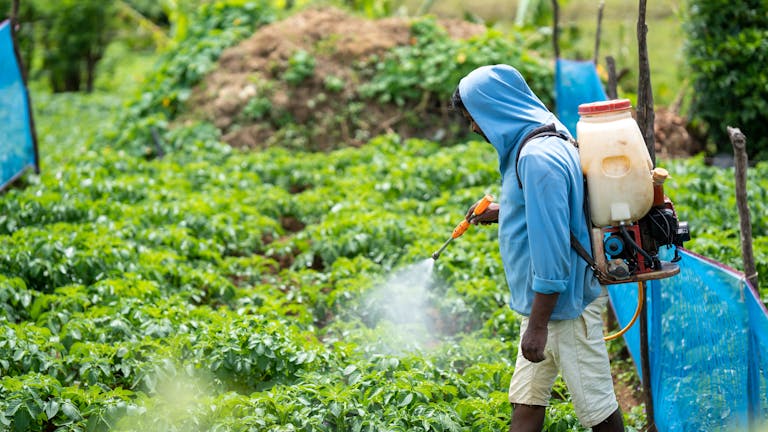10 plants that repel wasps
Are you looking for ways to keep wasps away from your pool, garden, or orchard? While wasps play an important role in the ecosystem, they can be a nuisance and even dangerous in certain situations especially if you have young children or are allergic to their stings. Fortunately, there are natural and eco-friendly ways to keep wasps away from your garden or outdoor area, using plants that act as natural repellents.
In this article, we’ll explore some of these plants and how they can help you enjoy your outdoor space without worrying about wasps.
1. Lemon Geranium (Pelargonium crispum)
Lemon Geranium, also known as Pelargonium crispum, is an ornamental plant valued not only for its attractive foliage and vibrant flowers but also for its powerful insect-repelling properties. This plant emits a citrus scent that is extremely unpleasant to wasps and bees, making it an excellent choice for keeping these pests away from terraces, patios, and gardens. Besides its repellent function, Lemon Geranium is easy to care for and can grow in pots or directly in the ground, adapting well to various light and soil conditions, making it a versatile and effective option for any outdoor space.
2. Jasmine (Jasminum spp.)
Jasmine, known for its fragrant white or yellow flowers, is a popular ornamental plant for gardens and terraces. While its sweet aroma is highly appreciated by humans, it also has repellent properties that help keep wasps and bees away. The intense floral scent of jasmine can confuse and deter these insects, encouraging them to seek shelter elsewhere. Additionally, jasmine is relatively easy to care for and can thrive in pots or directly in the ground, as long as it receives enough sunlight and moderate water. Incorporating jasmine into your outdoor space not only adds beauty and fragrance but also contributes to a pest-free environment.
3. Spearmint (Mentha spicata)
Spearmint is an aromatic plant whose strong, minty scent is unpleasant to wasps. In addition to being an effective repellent, it is easy to grow and maintain, and you can use it in the kitchen to add a fresh touch to your dishes.
4. Thyme (Thymus vulgaris)
Thyme is another aromatic plant that wasps tend to avoid. Its distinctive scent is appreciated in cooking but is unpleasant to many insects, including wasps. Plant it in your garden or in pots near areas where you spend time outdoors.n specific areas.
5. Eucalyptus (Eucalyptus globulus)
Eucalyptus not only repels wasps but also other annoying insects like mosquitoes and flies. Its leaves release an essential oil with a strong aroma that is uncomfortable for these insects. You can plant eucalyptus trees in your garden or use eucalyptus branches in specific areas.
6. Basil (Ocimum basilicum)
Basil is known for its ability to repel a variety of insects, including wasps. It is a versatile plant that can also be used in cooking. Place basil pots on windowsills and near doors to keep wasps away from your home.
7. Citronella (Cymbopogon nardus)
Famous for repelling mosquitoes, citronella is also effective against wasps. The plant emits a strong, citrusy scent that is unpleasant for many insects. You can plant citronella around your garden or use citronella candles for a similar effect.
8. Lavender (Lavandula angustifolia)
Although lavender’s aroma is pleasant for humans, wasps and other insects find it repulsive. Additionally, lavender is a beautiful ornamental plant that can add color and fragrance to your garden.
9. Wormwood (Artemisia absinthium)
Wormwood, also known as Artemisia, has natural repellent properties against wasps and other insects. Its strong scent and bitter taste make it less attractive to pests. This plant is easy to grow and can be an interesting addition to your garden.
10. Clove (Syzygium aromaticum)
Clove, mainly known as a spice, is also effective at repelling wasps and bees. Its strong, pungent aroma is unpleasant for these insects. Use clove essential oil or plant cloves in pots.
How to use these plants to repel wasps
To maximize the effectiveness of these repellent plants, consider planting them in strategic areas around your garden or patio. Place pots near doors, windows, and outdoor dining areas. Additionally, you can use fresh or dried leaves from these plants to create homemade repellents.
Ecological benefits
Using plants as natural repellents is an eco-friendly and sustainable way to manage wasps and other insects. Unlike chemical pesticides, these plants do not harm the environment and can attract beneficial pollinators, such as bees and butterflies, contributing to your garden’s biodiversity.



